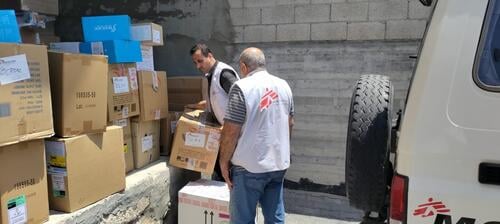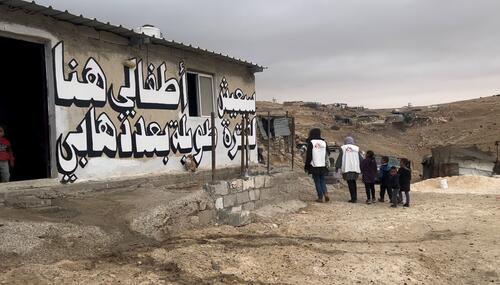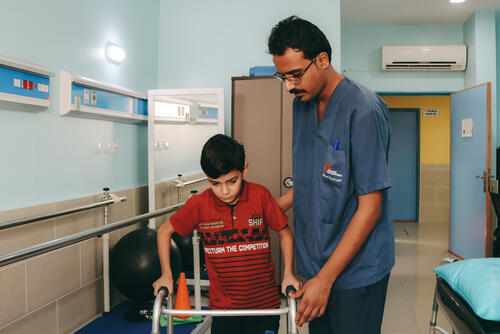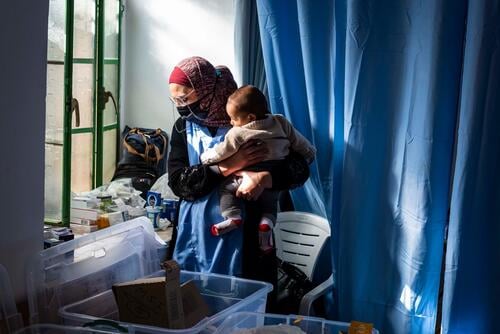Sakhar was asleep when a bomb hit his family home in Gaza City, Palestine. When he awoke he knew exactly what was happening. That was before he lost consciousness and was transported to the hospital, where he came to, and realised that once again, he and his family had survived.
Sitting in a Médecins Sans Frontières (MSF) Gaza clinic on 10 August, five days after the bombing and two days after a ceasefire was announced, Sakhar swipes through photos on his phone, sent by his neighbours. They show him and his brothers unconscious on the ground, faces covered in blood and dust. He marvels at the fact that here they are, still alive.
In Gaza, [in the past 15 years] we’ve had five wars, and every time there’s an airstrike we have a huge amount of [injured people] that all come to the hospital at one time.Osama Tawfiq Hamad, MSF anaesthesiologist
Not only did Sakhar, who is 30 years old and a father of four, survive the August 2022 bombing, he also survived another bombing during the 2014 war in Gaza, after which he needed skin grafts. Today, his back is covered in fresh, open cuts, and he has come to the clinic, with his two younger brothers, both of whom sustained severe fractures and abrasions.
Their family are among the approximately 360 Gazans who sustained severe injuries during this round of escalation, joining the several thousand others who have been injured or disabled by one of the five wars on Gaza that have taken place in a 15-year span of time. This time around, according to the United Nations, 49 Gazans were killed, including 17 children.https://www.ochaopt.org/content/humanitarian-impact-gaza-escalation-hostilities-immediate-needs-and-funding-requirements-august-2022
For Gazans like Sakhar and his brothers, the cycle of repeated wars has led to compounded physical and mental health traumas. For healthcare workers, too, the scenes in the emergency rooms have become all too familiar.
Osama Tawfiq Hamad, an anaesthesiologist was working on Friday night when the bombs began to hit Gaza. He describes how the emergency room at Al-Awda hospital filled up within minutes, receiving over 15 patients including six children. He treated one young child who had been hit with shrapnel to the skull, and another with a haematoma in the chest, both requiring urgent surgery.
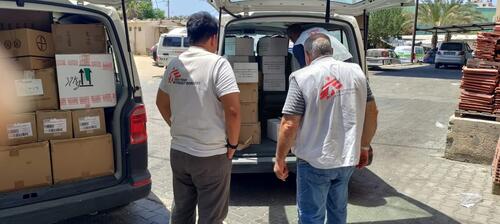
“In Gaza, [in the past 15 years] we’ve had five wars, and every time there’s an airstrike we have a huge amount of [injured people] that all come to the hospital at one time,” says Dr Osama. “You could have 50 or more patients at a time. In these moments, we have very bad emotions, but you must be strong to deal with the cases.”
Shadi Al-Najjar, who manages the physiotherapy department at Al-Awda hospital, has returned to work, managing existing and new patients, despite his own experience over the weekend. His home was partially destroyed on the second day of the escalation, as his neighbours house was hit.
His family didn’t have a chance to evacuate before his nine-month old son’s room was damaged – he found him in his crib surrounded by glass and shrapnel, but without injury. He says his youngest daughter has been traumatised.
“She is not able to sleep, she's crying all the time, I am trying to be as supportive as I can for them,” he says.
49
49
17
17
360
36
Like Shadi, Sakher also emphasises that one of the worst parts of coping with the aftermath is in trying to support his children emotionally.
“My eldest is now five years old. And after this escalation my son has been asking me to stop the war, and he always screams at night, he has not slept for three nights and when he is asleep he wakes up from nightmares and starts running and I don’t know what to do or how to help him,” says Sakher.
My eldest is now five years old. And after this escalation my son has been asking me to stop the war...Sakher, MSF patient
The trauma of repeated violence in Gaza has made a discernible impact on children and parent’s mental health. According to the World Health Organisation in 2021, 82 per cent of adolescents in Gaza reported poor to very poor levels of mental wellbeing.
The United Nations’ 2022 Humanitarian Needs Overview states that more than half (53 per cent) of all children in Gaza are in need of child protection and mental health services. Additionally, 137,000 caregivers in Gaza are in need of mental health services.https://www.ochaopt.org/content/humanitarian-needs-overview-2022
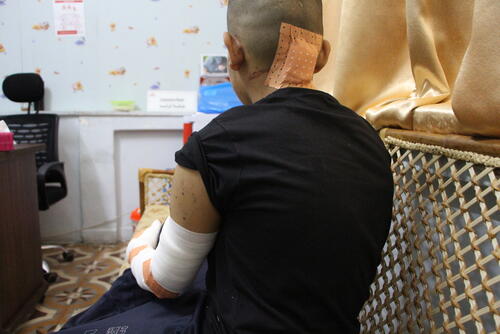
In the days following the escalation, MSF staff members and patients frequently expressed their concern for their children and other young people in Gaza who have grown up or will grow up in an environment where escalations take place with disturbing regularity.
After his wound dressings were changed, Wael - Sakhar's 13-year old brother - was asked by an MSF support worker what he wants for the future.
“I hope that there will be no wars in the future, and the calm [in Gaza] stays, without any bombings,” he says.



